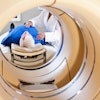
GENEVA (Reuters), Jun 4 - Particle physicists and medical scientists are to combine efforts to develop early detection techniques and advanced treatments for cancer as spin-offs from research into the origins and makeup of the universe.
The CERN European nuclear research organization, home to the world's largest particle collider, the LHC, said on Thursday the program would explore new ways of fighting cancer by ensuring doctors and physicists work together rather than in isolation.
The program will focus on high-resolution imaging that can spot tumors in their early stages, the overall effects on the human body of particle therapy for cancer, and other topics, CERN said in a statement.
Dubbed "Physics for Health in Europe," the program will ensure researchers from all over the continent meet frequently to exchange ideas and discoveries that could provide avenues to new treatments or to improving existing ones.
Another aim will be to create a European center to supply hospitals and research centers with innovative radioisotopes. A CERN facility to provide particle beams to outside users for use in radiobiology and detector development is also envisaged.
The plan emerged this year from a workshop that brought 400 physicists, biologists, and medical doctors to Geneva to review their areas of research.
"Often medical doctors and physicists may not know which aspects of their work will be relevant to one another," Oxford University cancer specialist Gillies McKenna said in the CERN statement, explaining the point of the program.
CERN is best known for its project to establish what happened after the Big Bang that created the cosmos some 13 billion years ago.
CERN, the European Organization for Nuclear Research, has an annual budget of 10 billion Swiss francs ($8.7 billion), which includes the cost of running the Large Hadron Collider, the world's largest scientific machine deep underground at the foot of the Jura mountains.
Skeptics have argued that the money should be put to what they say would be more practical uses, but the body's member governments vote regularly to maintain its financing despite being under pressure for spending cuts of their own.
By Robert Evans
Last Updated: 2010-06-03 13:04:15 -0400 (Reuters Health)
Copyright © 2010 Reuters Limited. All rights reserved. Republication or redistribution of Reuters content, including by framing or similar means, is expressly prohibited without the prior written consent of Reuters. Reuters shall not be liable for any errors or delays in the content, or for any actions taken in reliance thereon. Reuters and the Reuters sphere logo are registered trademarks and trademarks of the Reuters group of companies around the world.



















